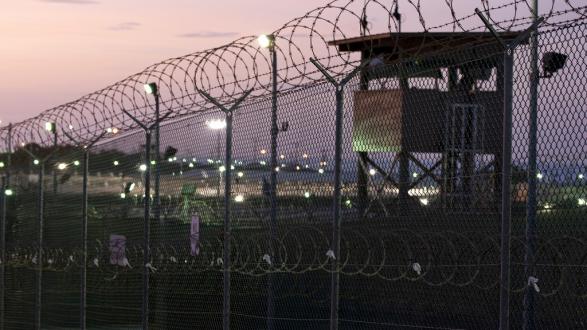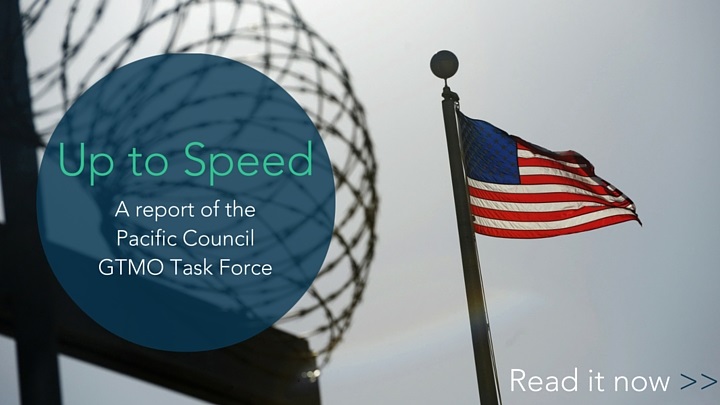From May 30 to June 3, 2016, I represented the Pacific Council as an official observer at pre-trial hearings for Khalid Sheikh Mohammed (KSM) and four other alleged masterminds of the World Trade Center and Pentagon attacks of September 11, 2001.
They are charged with war crimes under the Military Commissions Act of 2009. After false starts and the failure of an earlier military commission, the current proceedings began in May 2012 and almost immediately became mired in procedural, discovery, and other pretrial issues. Since then delays, postponements, and countless incidents sidetracking the proceedings have kept progress painfully slow.
As Guantánamo hearing weeks go, this was an ambitious one. The court heard 42 motions covering a wide variety of issues. Most involved the scope of discovery and the appropriate treatment of information deemed to be classified or otherwise sensitive. At this stage efforts appear to focus on evidence that may illuminate mistreatment of the prisoners—medical records, detainee statements, CIA oral-history-program interviews, and the like. Other motions sought to safeguard confidential communications between the accused and their attorneys. Several appeared to involve longstanding controversies yet to be resolved. Judge Col. James L. Pohl took all motions under advisement for later ruling.
The military commission hearings were intended to provide a fair trial within a legitimate judicial framework.
Specific motions argued during the week included the following:
- Defense requested an expert to examine potentially cancerous contaminants discovered in the soil at Camp Justice where the courtroom is located (and where NGO observers live for the week in tents).
- Defense sought to establish secure phone connections between their clients at Guantánamo and their offices in the United States.
- Defense teams argued for the United Nations Special Rapporteur on Torture to gain access to Camp 7 to assess conditions there. They also sought additional information on the CIA’s spying on attorney-client meetings (discovered in 2013), and schematic diagrams of the courthouse reflecting installed electronic monitoring devices that were discovered and subsequently ordered to be removed.
- Ramzi bin al Shibh sought to hold detention camp authorities in contempt of Judge Pohl’s November 2, 2015, order “not to subject Mr. Bin al Shibh to disruptive and harassing noises and vibrations.” In support, Somalian detainee Guleed Hassan Dourad testified to sounds, vibrations, and strange smells emanating from his cell at night preventing him from sleeping. “We have mental torture in the Camp 7,” Guleed testified in English. He was captured in 2004, turned over to the United States and, since 2006, detained at Guantánamo. To date he has not been charged with an offense.
- In a last minute upset, the court postponed what was to have been the world’s first glimpse of a notorious War on Terror prisoner known as Abu Zubaydah, whom the CIA subjected to some of the most brutal known interrogations of the post-September 11 era—waterboarding, forced nudity, confinement to a coffin-sized box—and concluded that he should be kept incommunicado for the rest of his life. Zubaydah, who was to testify in support of bin al Shibh’s allegations, made it all the way to the war court door but never stepped inside to testify about conditions in Guantanamo’s clandestine Camp 7. Before he could do so, his Navy lawyer, Cmdr. Patrick Flor, announced in court that he would object to any questions that might incriminate his client, risking Zubaydah's entire testimony being struck from the record and prompting lawyers to postpone the testimony until July at the earliest.
- KSM sought approval to send a letter he had prepared to President Obama, claiming a right of confrontation. But first, he had to get the letter back from the authorities to whom it had been presented to approve its dissemination (JTF GTMO, DOD, etc.). In a typical GTMO result, each agency had declined to authorize dissemination on what sounded to me like narrow bureaucratic justifications, but refused to return the letter, claiming it might contain information too sensitive or otherwise inappropriate for disclosure to KSM—its author.
- At one point in the argument, KSM touched off a shouting match with Judge Pohl by announcing inexplicably in Arabic, “This is a nuclear bomb in the world.” Before he could elaborate, Judge Pohl shouted him down and threatened to eject him from court, adding that he would not tolerate defendants talking without permission in court.
- An imaginative argument that took up the better part of a morning session was defense counsel James Connell's claim that U.S. domestic law incorporates various international laws and treaties on the treatment of detainees, which he argued must be applied in this case. One of the forces slowing these proceedings appears to be a lack of clarity on the procedures, jurisdiction, and laws that should be applied in the context of a military commission sitting in Guantánamo.
As is his custom, Judge Pohl made no substantive rulings from the bench, promising them at unspecified later dates after further consideration.
Chief Defense Counsel Brigadier General John Baker said he expects the focus of the 9-11 hearings for the “next period of time” to be on discovery of classified information, a process he said was “in its infancy.” Despite defense lawyers joking on occasion that “peace may have broken out” with the prosecution team, Baker said there have been few instances of the parties coming together to resolve matters outside of the courtroom. “The way litigation has unfolded,” he said, “there’s virtually no getting together and working it out.” According to one defense team member, the trial is not likely to begin before the end of 2019. Another predicted a start date “between 5 and 10 years from now.”
The military commission hearings were intended to provide a fair trial within a legitimate judicial framework. The painful delays and seemingly endless pretrial procedures threaten to erode perceptions of legitimacy and fairness, and they must be addressed if the United States hopes to restore its standing in the international community as a champion of human rights.
I believe these delays stem from a variety of sources, including the following:
Systemic inadequacies. The system itself may be flawed. New twists in the case seem to occur frequently, functionally shutting the process down until the controversies can be resolved. The military court has few legal precedents to go by, so nearly every issue that comes up causes another delay, breeding issues to litigate. Also, delay may further a defense objective in these capital cases for as long as possible to keep their clients from being executed.
External influences. Although it is difficult to resist concluding that government prosecutors are unduly uncooperative, one must also appreciate the difficult task they have trying to conduct a trial with their every move scrutinized by outside agencies like the CIA, FBI, and NSA, all of which have a say in withholding or redacting potentially confidential or merely embarrassing discovery materials. Working through their objections is proving a daunting and massively time-consuming task. Also, the Joint Task Force Guantánamo, which operates the detention facilities, does not appear to be subject to many orders by the military judge. This makes it difficult for the court to influence prison conditions or ensure defense counsel access to their clients.
Judicial temperament. Judge Pohl is doubtless a capable jurist in many respects. He clearly is intelligent, has a firm grasp of the pleadings, and understands the issues. His reluctance to rule on motions in a timely manner, acceptance of prosecution recalcitrance in turning over documents, and possibly over-cautious navigation of admittedly uncharted legal waters, however, all add to the perception that this trial may never end.
The Pacific Council has recommended several means by which to re-establish legitimacy of the military commission process and, beyond that, our nation’s credibility on the world stage by expediting and bringing transparency to these proceedings, most notably by appointing a federal district court judge to preside over the military commission trials. This recommendation should receive more attention.
____________________
Steven Stathatos is Of Counsel to Buchalter Nemer in Los Angeles and a member of the Pacific Council. He earned his A.B. degree summa cum laude in 1974 from Stanford University, his M.A. at Stanford University, and his J.D. at Stanford Law School in 1978.
Since 2013, Pacific Council members have attended the Guantánamo proceedings as official nongovernmental observers; together, they have spent over 100 days on the island. Read more about the Guantánamo Bay Observer Program.
The views and opinions expressed here are those of the author and do not necessarily reflect the official policy or position of the Pacific Council.





